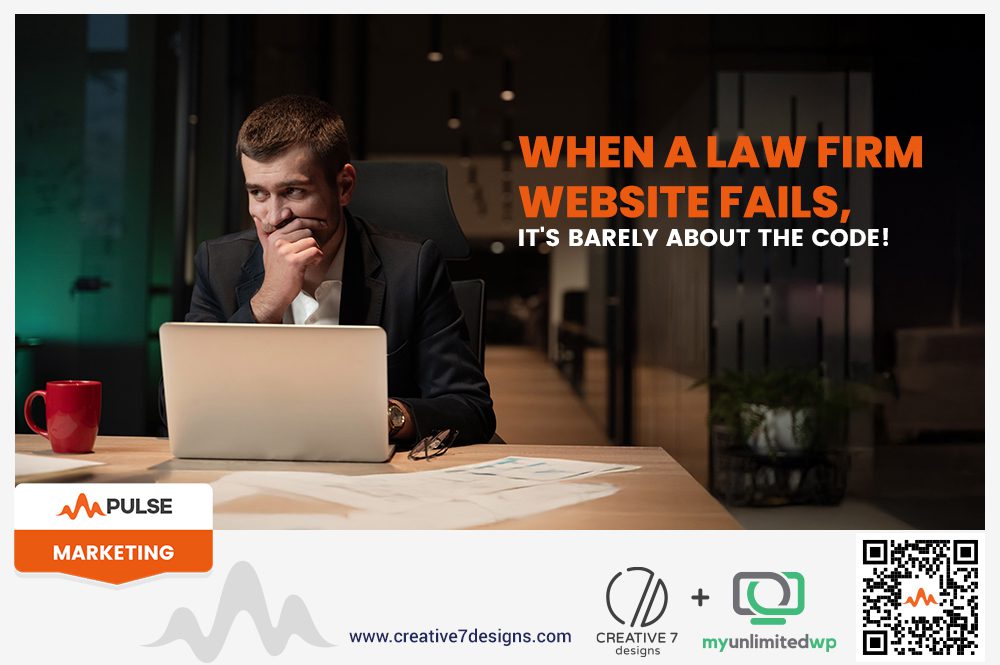Overview: Law firm websites rarely fail because of bad code. They fail because of weak messaging, poor strategy, and missed connection. Discover how to fix what actually matters. Read on to learn more!
“We just need to update the site code.”
That’s what we hear from law firms far too often when their website isn’t delivering leads. But here’s the truth:
Websites don’t fail because of weak code. They fail because of a weak strategy.
Let’s set the record straight: if your law firm’s website isn’t attracting leads or converting visitors, it’s probably not your developer’s fault, or at least, not entirely.
Yes, clean code is important. But code alone doesn’t build trust, showcase expertise, or guide your ideal client to take action.
So when a law firm website fails, it’s rarely a backend issue. It’s a brand issue. A strategy issue. A clarity issue.
Here’s what’s really going wrong and how to fix it.
1. You’re Not Telling a Case-Worthy Story
Lawyers know the power of storytelling in court, but too many forget it online.
Think about it: clients come to your site in the middle of uncertainty. They’re anxious, confused, or even scared. If your homepage reads like a resume instead of a reassuring narrative, they’re gone before the second scroll.
The strongest law firm websites mirror the client’s emotional journey. They lead with clarity, offer answers before questions are even asked, and position your firm as the steady hand guiding the way forward. Legal credentials matter — but context and empathy are what convert.
Also Read >> 6 Essential Elements of Law Firm Website Design
2. “Clean and Professional” Isn’t a Differentiator
Most law firm websites aim to look polished and authoritative. And that’s fine — until you realize every competitor is doing the exact same thing.
The firms that truly stand out aren’t afraid to show a little personality. Not gimmicks — just clarity. A distinct voice. A glimpse into what makes your approach to the law different. This doesn’t just build brand recognition — it builds trust before a single consultation.
Design and tone should reflect who you actually are — not just what tradition says a law firm “should” be.
3. SEO Without Empathy Is Just Noise
Ranking on Google is only the beginning. Once a potential client lands on your site, they need to feel seen.
Too many legal websites sacrifice human connection in the name of keywords. The result? Content that might satisfy search engines but completely misses the mark with real people.
Modern SEO is about relevance and resonance. It’s about anticipating the kinds of questions a nervous client might type into Google at 2 a.m.— and offering calm, confident answers in a voice that sounds like a trusted advisor, not a textbook.
4. The User Journey Ends Before the Verdict
A sleek design, strong copy, decent traffic, and still no calls?
That’s often because the user journey hits a dead end. There’s no clear next step, no sense of momentum. It’s like delivering a brilliant argument in court… and forgetting to ask for the verdict.
Conversion happens when a website moves with purpose. When every page guides visitors naturally toward an action — be it a consultation, a call, or simply spending more time engaging with your expertise. A website should never feel like a lecture. It should feel like a dialogue in motion.
5. Your Website Doesn’t Sound Like You & That’s a Problem
If your website could belong to any law firm in your practice area, it probably isn’t doing much for yours.
Your voice, your values, and your process are part of what makes your law firm unique. When those elements are watered down by generic copy and templated design, you become forgettable.
The firms winning online today are the ones showing up with authenticity and clarity. Their messaging feels personal. Their story feels intentional. And their clients feel a connection before the first conversation even happens.
>> Related Reading: 8 Elements That Elevate Your Legal Website Content
The Closing Argument
The most common misdiagnosis in law firm marketing? Blaming the tech when the messaging is what’s broken.
A great website isn’t just fast and functional — it’s persuasive. Strategic. Human. And it speaks directly to the people you’re trying to help.
Because in the end, your website doesn’t need more features. It needs more you.
From brand voice to site structure, we’ll help you create a site that reflects your expertise and actually works for your business.
Explore Pulse:Marketing or reach out for a consultation. We’re ready when you are.


